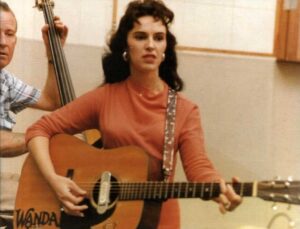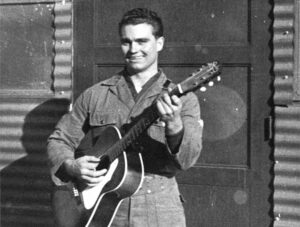Now that the new baseball season is under way, it’s time to reflect on the rites of passage for a sport — the millions upon millions of baseball hopefuls from age 9 to 90, and Americana itself.
Back in the 1970s, an American car manufacturer said, “They go together, in the good old USA — baseball, hot dogs, apple pie, and (insert your rhyming car make here).” The manufacturer made a good point.
All those things are certainly American — but when it comes to country music, looking back on the ambassadors for the nation as good, wholesome, true All-American guys, look no further than The Statler Brothers.
It’s hard to believe the Statlers have been retired from music for over 20 years. And they aren’t a group that keeps coming back for reunion tours now and again.
When the Statlers hit the proverbial “wall” in the music business, they knew it. They walked away and didn’t look back, except for Jimmy Fortune, who was younger than the other three and set out on a solo career.
There are a lot of myths about the Statlers, and some of them are even true.
It’s true that only two of the four members of group were brothers (Harold Reid and Don Reid), and it’s true that all four of the memorable quartet hailed from Staunton, Virginia — a place that might just as well be known as “Hometown USA.”
It’s a myth that anyone associated with the quartet was named “Statler,” but it’s a fact that they came up with the name from a brand of tissue they had seen in a motel room.
It’s also largely a fact that the Statlers were the first official music “group” in modern country music. While other groups that followed (the Oak Ridge Boys, Alabama, Shenandoah, etc.) may share some similarities, the Statlers were originals, a quartet that crossed over from gospel to country.
The group won countless awards even beyond its heyday, the Music City News Country Awards being among their most frequent achievements.
But what could one expect? The Music City News (since defunct) was the newsletter of the industry, and just about every little old lady who ever traveled to Nashville to see a taping of “Nashville Now” subscribed.
So, the Statlers’ popularity carried on far longer than it otherwise might have, both thanks to little old ladies and the fact that the group was truly “red, white and blue” (and they even wore the matching stage outfits to prove it).
While many songs the Statlers released are well known as hits, hundreds of others never made it to the radio waves. They are found on vinyl records spanning from 1955 to 2002, and there is a lot to explore.
But, since its baseball season — and the Statlers are the originals when it comes to being all-American country music performers — let’s look at a baseball song from the group’s 1979 album, aptly titled “The Originals.”
“When the Yankees Came Home” is a baseball story penned by Don Reid, who sings lead on most Statlers’ songs.
At first listen, “When the Yankees Came Home” might seem straightforward — but when you put your mind to it, it’s more complicated than it seems. Even Don Reid, who based the song on a sports headline that became the title, admits the song can be interpreted many ways.
“The phrase,” he said, “’the Yankees come home,’ can mean so many things.” He added that the Yankees’ reputation (you either love them or hate them) made writing a song that appealed to both Yankees fans and Yankees haters an interesting endeavor.
“When the Yankees Came Home” is a ballad following the lives of a ballplayer and his girlfriend as the young man embarks on a pitching career. “Some way, I’m gonna play in the big leagues someday,” sets the tone for the story that follows. The girl realizes her boyfriend has a dream, unfortunately one that didn’t necessarily focus on her.
She hangs around for a few seasons, but then “she left him one spring, Triple-A second string, and went home and married a friend.”
This is where the song starts to get interesting and, if you will, a bit confusing.
In the next “scene,” we find the girl, now a woman, at home with her family, which includes two sons. It seems these sons have elevated her ex-boyfriend to hero status, as he finally made it to the big leagues.
They beg their mom to “come and see, here on TV. It’s the last and biggest game of the year. The count is full. The score is tied. Ninth inning, bottom side. He’ll strike him out. Wait and see. They both cheer.”
Next we learn that our hero has taken the mound against the Yankees, a team “he loved to hate.” At this point it doesn’t really make a difference — and the lyrics don’t reveal — for what team he pitches. But we do know he’s pitching in New York. The fact he’s on the mound in the bottom of the ninth inning, when the home team bats, tells us the Yankees are in their home ballpark.
The lyrics never tell us what happens. They only say the boys’ mother knew his dream was coming true. Then the song ends with the line, “The family wondered why there were tears in Momma’s eyes, because she cried when the Yankees came home.”
So, what does the story mean, and what happened in that last inning that set Momma to crying? It’s hard to say.
Interpreting the lyrics as they are written will probably lead you to believe the pitcher failed, the Yankees came home (as in “scored a run at home plate”), and she’s crying because her former love failed.
If we didn’t know the game was played in New York, we might interpret the lyrics differently. “When the Yankees Came Home” could have meant they disembarked from the train or airplane as losers.
But that can’t be the case, because it is clear the game was played in New York.
On the other hand, “the Yankees came home” could be interpreted that it didn’t really matter which team won “the last and biggest game of the year,” because the Yankees had already made the playoffs and would simply be playing the first game in their home stadium.
It’s a conundrum, and one Don Reid created intentionally.
He admits as much in the album notes. Pick your favorite team and place them in the song, and it will come out just the way you like it, he essentially wrote.
Well, if I’m putting my favorite teams in place of the Yankees, I’m probably happy.
From all indications when interpreting the song, the Yankees likely won the game.
On the other hand, if I put my favorite team on the mound, perhaps the moral of the story is that we live and die with the teams we cheer for. After all, it’s the American thing to do.
Until next time, keep in mind that the highways are no place for games. Keep your eyes open for all the possibilities.
Since retiring from a career as an outdoor recreation professional from the State of Arkansas, Kris Rutherford has worked as a freelance writer and, with his wife, owns and publishes a small Northeast Texas newspaper, The Roxton Progress. Kris has worked as a ghostwriter and editor and has authored seven books of his own. He became interested in the trucking industry as a child in the 1970s when his family traveled the interstates twice a year between their home in Maine and their native Texas. He has been a classic country music enthusiast since the age of nine when he developed a special interest in trucking songs.






